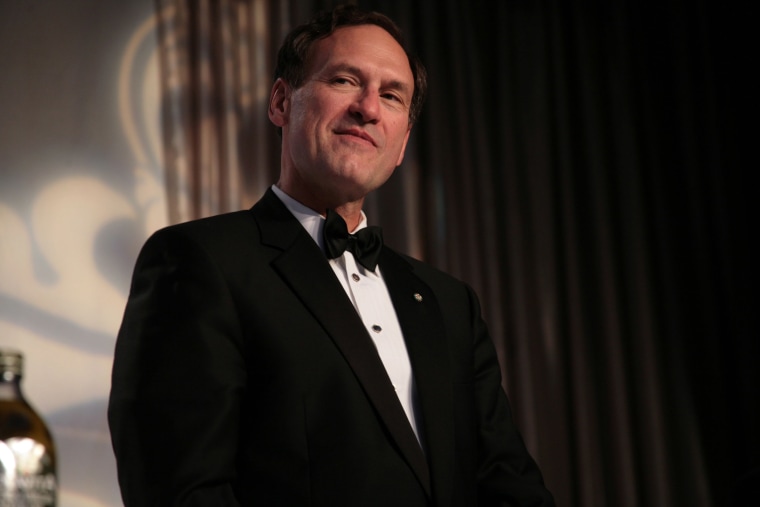When sitting Supreme Court justices make public appearances, they generally try to maintain some degree of impartiality, in part because they don't know what cases they may yet hear, and in part to reassure the public that the judiciary can be trusted to remain neutral and independent.
Occasionally, however, justices drop the pretense. Last night, for example, Supreme Court Justice Samuel Alito publicly criticized restrictions imposed because of the coronavirus pandemic. The Associated Press reported:
"The pandemic has resulted in previously unimaginable restrictions on individual liberty," Alito said in an address to the conservative Federalist Society, which is holding its annual convention virtually because of the pandemic.... "Whatever one may think about the COVID restrictions, we surely don't want them to become a recurring feature after the pandemic has passed," said Alito, who was nominated to the court by President George W. Bush.
And while it was jarring to hear Alito, who has no background in epidemiology or public health, publicly criticize efforts to control the pandemic, that was really just the start of what made his remarks so extraordinary. Slate's Mark Joseph Stern explained:
Alito abandoned any pretense of impartiality in his speech, a grievance-laden tirade against Democrats, the progressive movement, and the United States' response to the COVID-19 pandemic. Alito's targets included COVID-related restrictions, same-sex marriage, abortion, Plan B, the contraceptive mandate, LGBTQ non-discrimination laws, and five sitting Democratic senators.... Flouting his ethical obligations, Alito waded into fierce political debates over public health during a pandemic, reproductive rights, LGBTQ equality, and other issues that routinely come before his court.
By any fair measure, Alito sounded less like a traditional Supreme Court justice and more like a partisan politician, eagerly sharing his views on a range of issues with like-minded allies.
And in the process, he did a favor for progressive advocates of reforming -- and perhaps expanding -- the federal judiciary. For many on the left, a lengthy Republican crusade to stack the courts with far-right ideologues has not only succeeded, it's also created a crisis of sorts, with much of the country fearing the consequences of an overtly politicized judicial system.
It was against this backdrop that Alito appeared before a conservative group -- the Federalist Society has helped tell the Trump White House exactly which conservative ideologues to nominate to the federal bench -- and delivered what was effectively a political stump speech, offering fresh evidence that the court's progressive critics are correct.
"You can't say that marriage is a union between one man and one woman" anymore, the justice whined, as if he were a social conservative candidate appealing for votes. "Until very recently, that's what the vast majority of Americans thought. Now it's considered bigotry."
He proceeded to chastise five Democratic senators who endorsed "restructuring" the high court, describing it as "wrong," and an "affront to the Constitution."
But given Alito's latest political posturing, those five Democratic senators -- Richard Blumenthal (D-Conn.), Dick Durbin (D-Ill.), Kristin Gillibrand (D-N.Y.), Mazie Hirono (D-Hawaii), and Sheldon Whitehouse (D-R.I.) -- sure do look like they have a point.
The justice's speech -- which was scripted and pre-recorded -- did not go unnoticed in legal circles. "This speech is like I woke up from a vampire dream," University of Baltimore law professor and former federal prosecutor Kim Wehle wrote. "Unscrupulously biased, political, and even angry. I can't imagine why Alito did this publicly. Totally inappropriate and damaging to the Supreme Court."
The L.A. Times' Harry Litman added that this was "as politically partisan a speech as I’ve ever seen from a justice," adding that Alito's remarks were "arrogant, tendentious, and sloppy."
It won't soon be forgotten.

